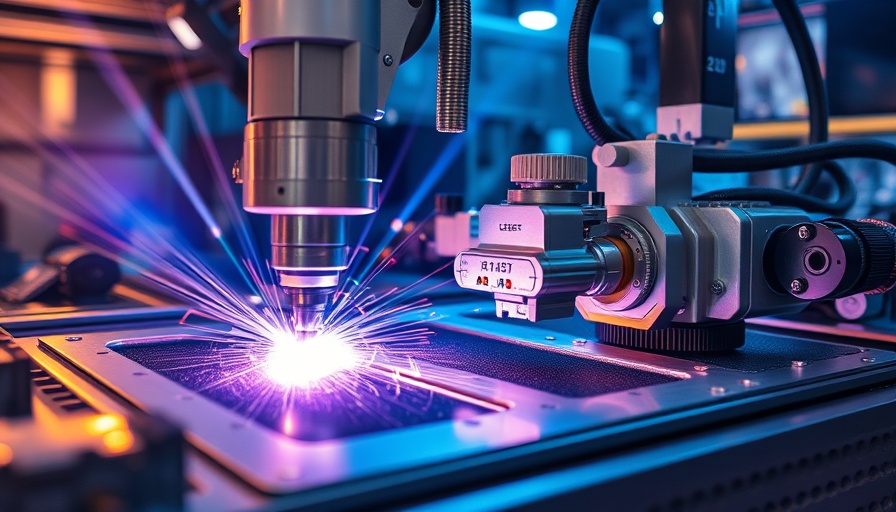
Revolutionizing Manufacturing: The Role of Machine Learning in Laser Processing
As industries increasingly rely on precision and efficiency, the integration of machine learning into laser-based manufacturing processes has emerged as a revolutionary advancement. Machine learning is enhancing traditional laser methods, enabling manufacturers to produce intricate components with improved accuracy and reduced costs.
Why Laser Processing Matters
Laser-based technologies have transformed production lines, particularly in sectors such as automotive and aerospace. These processes allow manufacturers to create complex parts, like customized titanium implants, quickly and efficiently. However, achieving maximal performance with lasers has not come without challenges; the precision required can make even minor deviations in settings lead to significant production errors.
The Challenge of Traditional Laser Techniques
Despite the benefits of laser processing, conventional methods often require extensive preparatory work to calibrate lasers for each manufacturing task. For instance, the transition from conduction mode, where lasers melt material, to keyhole mode, which vaporizes it, necessitates precise settings that can vary dramatically from batch to batch. This variability not only complicates the process but also adds time and costs to production.
Machine Learning: A Game Changer
To address these challenges, researchers at the Swiss Federal Laboratories for Materials Science and Technology (EMPA) are harnessing machine learning to streamline laser-based processes. By training algorithms to analyze and predict the optimal settings for laser parameters based on material properties, researchers are significantly reducing the number of preliminary tests needed. As noted by researcher Giulio Masinelli, understanding the intricate balance between vaporizing and melting materials not only improves efficiency but enhances the quality of the final products.
Real-World Applications of Enhanced Laser Processing
One standout application of machine learning in laser processes is its role in additive manufacturing, specifically in Metal Powder Bed Fusion (PBF). Here, lasers meticulously melt layers of metallic powder to create parts layer by layer. By using machine learning algorithms that adapt to each material's properties, manufacturers can produce components precisely tailored to their specifications, providing advantages that traditional methods could not achieve.
Impact on Cost and Efficiency
The automation of optimal parameter identification means significant savings in both time and resources. Fewer unsuccessful runs due to misconfigured settings equate to lower production costs. Moreover, manufacturers can expect a faster response to changes, minimizing downtime and enhancing supply chain resilience. This shift is particularly beneficial for industries that operate under tight deadlines and demand high-quality standards.
Looking to the Future: Predictions and Opportunities
The future of manufacturing using lasers is lively with possibilities. With the advancement in machine learning applications, it’s likely we’ll see even further integration of artificial intelligence in industrial processes. Predictive analytics could foresee maintenance needs or even adjust settings in real-time, fundamentally altering how manufacturers approach production efficiency.
Exploring Local Impact: Dallas and the Industrial Scene
As cities like Dallas strive to cultivate their technological landscape, the integration of machine learning in industrial laser processes presents an opportunity for local businesses. Manufacturers in sectors such as automotive and aerospace can benefit from adopting these advanced technologies, positioning Dallas as a hub for innovative production techniques. As seen in local lifestyle magazines, this technological evolution not only promises enhanced productivity but also aligns with broader narratives around improving the cost of living in Dallas through job creation in emerging fields.
Conclusion: Embrace the Change
As we stand on the cusp of a new era in manufacturing, embracing machine learning in industrial laser processes can redefine our approach to production. For those living in Dallas, understanding these advancements could foster new career opportunities and enhance the local economy. As we explore these technological integrations, it’s essential to recognize their potential in fortifying Dallas’s place in a competitive global market.
Consider diving deeper into how machine learning shapes industries today and what it might mean for your career. This is a pivotal time to engage with innovations that promise to transform our everyday lives!
 Add Element
Add Element  Add Row
Add Row 



 Add Row
Add Row  Add
Add 


Write A Comment